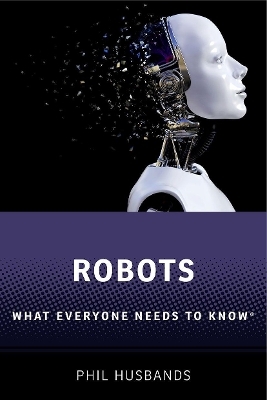
Robots
What Everyone Needs to Know®
Seiten
2021
Oxford University Press (Verlag)
978-0-19-884539-3 (ISBN)
Oxford University Press (Verlag)
978-0-19-884539-3 (ISBN)
Phil Husbands introduces the field of robotics, where it has come from, and where it might go in the future. Explaining the technology underlying robots and their capabilities today, he also considers both the ethical problems of robots with increasing intelligence, and the wider socio-political challenges they create.
A concise, accessible introduction to robots, what they can do, what they can't, and what their increasing encroachment into our lives might mean for us
Since the turn of the millennium a quiet revolution has been underway. Millions of autonomous robots with some level of intelligence are now in domestic use, mainly as vacuum cleaners. Driverless cars - which are nothing less than autonomous robots - are starting to appear on our streets. There is a huge effort underway in industry and universities to develop the next generation of more intelligent, autonomous, mobile robots. Accompanying these arrivals has been a steady stream of inflammatory articles in the media raising concerns over the impending spectre of super-intelligent robots, along with stories about how most jobs will soon be lost to robots.
Here, using the Question-and-Answer format, Phil Husbands gives a balanced and broad introduction to robotics and the current state of the field, analysing where it has come from, and where it might go in the future. He begins with the history of robotics and its complex relationship with popular culture, and then moves on to discuss the technology underlying robots in an engaging, non-technical way, exploring the limits of what robots can actually do now and what they might be able to do in the future. Naturally these machines, which often seem to display life-like properties, are attracting great attention. Do they pose a threat or an unprecedented opportunity? And although the 'singularity' may not be something to worry about, there are certainly ethical issues needing consideration as robots with some intelligence are used increasingly across many sectors. Husbands considers both these ethical problems and also the wider socio-political challenges that robots are already creating, and the larger ones they might bring in the future.
A concise, accessible introduction to robots, what they can do, what they can't, and what their increasing encroachment into our lives might mean for us
Since the turn of the millennium a quiet revolution has been underway. Millions of autonomous robots with some level of intelligence are now in domestic use, mainly as vacuum cleaners. Driverless cars - which are nothing less than autonomous robots - are starting to appear on our streets. There is a huge effort underway in industry and universities to develop the next generation of more intelligent, autonomous, mobile robots. Accompanying these arrivals has been a steady stream of inflammatory articles in the media raising concerns over the impending spectre of super-intelligent robots, along with stories about how most jobs will soon be lost to robots.
Here, using the Question-and-Answer format, Phil Husbands gives a balanced and broad introduction to robotics and the current state of the field, analysing where it has come from, and where it might go in the future. He begins with the history of robotics and its complex relationship with popular culture, and then moves on to discuss the technology underlying robots in an engaging, non-technical way, exploring the limits of what robots can actually do now and what they might be able to do in the future. Naturally these machines, which often seem to display life-like properties, are attracting great attention. Do they pose a threat or an unprecedented opportunity? And although the 'singularity' may not be something to worry about, there are certainly ethical issues needing consideration as robots with some intelligence are used increasingly across many sectors. Husbands considers both these ethical problems and also the wider socio-political challenges that robots are already creating, and the larger ones they might bring in the future.
Phil Husbands is Research Professor of Artificial Intelligence at the University of Sussex. He has been a leading researcher in AI, Robotics and Artificial Life for more than 30 years. He is one of the originators of the field of evolutionary robotics, was founding co-director of the Sussex Centre for Computational Neuroscience and Robotics and has worked extensively with industry. His research is wide ranging but centres on adaptive systems in robotics, AI and neuroscience. He is also a historian of AI and cybernetics.
Preface
1: Robots are Here
2: The Basics
3: Some History
4: Inside the Machine
5: Robot Fantasies: Robots in Popular Culture
6: Intelligence, Super-Intelligence and Cyborgs
7: Robots at Work
8: Robot Ethics
9: Robot Futures
| Erscheinungsdatum | 04.01.2022 |
|---|---|
| Reihe/Serie | What Everyone Needs To Know® |
| Zusatzinfo | 8 black and white images |
| Verlagsort | Oxford |
| Sprache | englisch |
| Maße | 141 x 209 mm |
| Gewicht | 222 g |
| Themenwelt | Geschichte ► Teilgebiete der Geschichte ► Technikgeschichte |
| Informatik ► Theorie / Studium ► Künstliche Intelligenz / Robotik | |
| Technik | |
| ISBN-10 | 0-19-884539-1 / 0198845391 |
| ISBN-13 | 978-0-19-884539-3 / 9780198845393 |
| Zustand | Neuware |
| Haben Sie eine Frage zum Produkt? |
Mehr entdecken
aus dem Bereich
aus dem Bereich
Buch | Softcover (2024)
Lehmanns Media (Verlag)
19,95 €
Digitalisierung neu denken für eine gerechte Gesellschaft
Buch | Hardcover (2023)
Quadriga (Verlag)
20,00 €
Vom Perceptron zum Deep Learning
Buch | Softcover (2022)
Springer Vieweg (Verlag)
19,99 €


